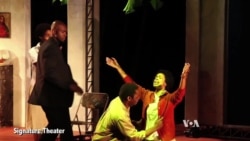In 1981, several young women at a religious boarding school in southern Rwanda reported seeing apparitions of the Virgin Mary, the mother of Jesus Christ in Christian belief. Others soon claimed to see her as well, and news of the visions swept the region, attracting throngs of religious seekers and inspiring a wave of conversions and calls for repentance. That's the inspiration for "Our Lady of Kibeho," a new play by African American writer Katori Hall, premiering at New York's Signature Theater.
The young women said that Mary called herself “the Mother of the Word,” and urged prayer and repentance to avert a terrible war. Yet, only one of the visions was anything but joyful. In that one, terrifying apparition in 1982, the young women said Mary showed them Rwanda’s rivers streaming with blood and bodies littering the ground. To many Rwandans later, it seemed as if that vision foretold the Rwandan genocide of 1994.
The visitations by Mary were first claimed by one teen, Alphonsine Mumureke, who experienced them periodically over the next eight years. Her classmates, Anathalie Mukamazimpaka and Marie-Claire Mukangango, soon also began reporting the apparitions, although Anathalie’s stopped after about two years and Marie-Claire’s in six months. A number of other girls also said they saw the apparitions, as did a young boy who lived nearby. Local Catholic officials investigated, and in 2001, Bishop Augustin Misago declared the first three girls' experiences to be genuine visitations. That was long after Marie-Claire's death, in one of two genocidal massacres in Kibeho. Alphonsine is still alive and lives near the shrine in Kibeho.
Playwright Hall said that she was 13 when she saw a news report on the genocide.
“I remember standing in front of the television in my bedroom in Memphis, Tennessee, and seeing all these brown bodies floating down the river,” she said in an interview at the theater, during a break in rehearsals. “And I was struck by it. That vision imprinted itself on my mind, and it stayed with me. I was like, how did this happen, why did this happen, why are these people who look like me floating down the river?”
It wasn’t until many years later, however, when she traveled to Rwanda in 2009, that she heard of the apparitions at Kibeho.
“I had always been wanting to write about that tumultuous moment in history,” she said, “and I was like, this is the perfect way, this is the perfect frame to do so. I didn’t want to do the usual during the genocide. I wanted to do something that was about the before.”
Directed by Michael Greif, the three-sided stage is overhung with video projections showing the mountains and sky above the simple buildings of the school, set in a banana-tree forest. Hall said she thinks the set “immerses the audience in Kibeho. You feel the wind, you see the banana leaves shifting back and forth. And the accents, the actors are amazing. A lot of them actually come from East Africa.”
But Hall said she wanted to leave open the question of whether the apparitions are objectively "true," despite one scene when the girls rise out of their beds and hang suspended in the air. Hall has no doubt that the apparitions were real to the students themselves, and wants the audience, as well, to believe in their experience, at least for the duration of the play. "That's the best approach to a play that is about miracles, and things that are supposedly impossible," she said.
Actor Joaquina Kalukango, whose parents are from Angola, and who grew up in Atlanta, Georgia, plays Marie-Claire. “I just like the fact that it’s before the genocide, you get to see the life in the community of these people before the littlest things, you get hints of the tension,” she said.
Ethnic resentments simmer among the schoolgirls in “Our Lady of Kibeho,” boiling up in jibes by some of the Hutu schoolgirls about favoritism they perceive toward Tutsis, and anger at the notion that Tutsi women were considered more beautiful. Hall, whose previous plays include “The Mountaintop,” about Martin Luther King’s last night before his assassination, said she made four trips in all to Rwanda and read several non-fiction histories to research “Our Lady of Kibeho.” She notes that the conflict was seeded by racist Belgian colonialists, who privileged Tutsis as being more European-like.
Kalukango, whose own family lost relatives in the Angolan Civil War, said that acting in “Our Lady of Kibeho” helped deepen her sense of what life demands.
“We have both sides in us, and you have to choose. You look at this play, and you have to take a moment with yourself and truly say, what are you going to do, what is your stance in the world, what do you believe, and what will be your standards, and what will you give, and will you show love,” she said. “I think that’s the beauty of this play; it allows you to confront those things head-on,” she said.






